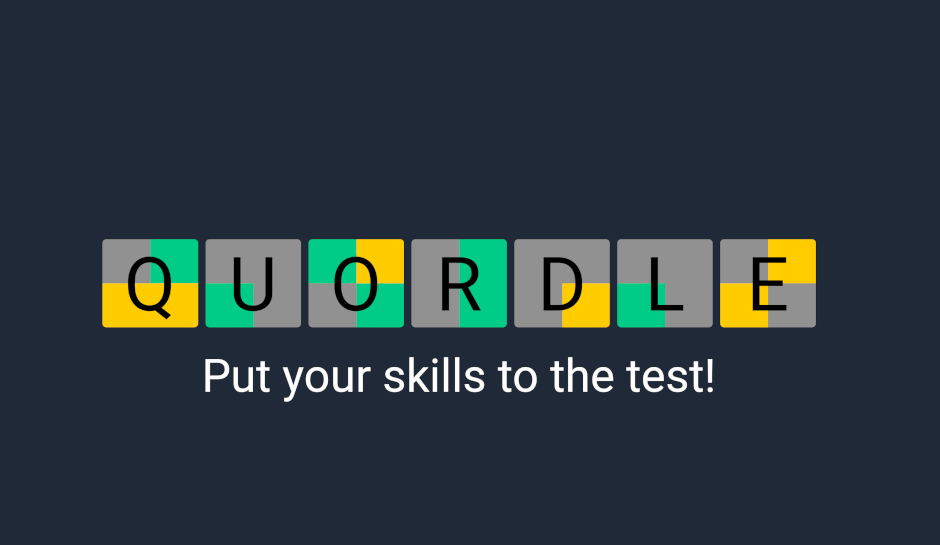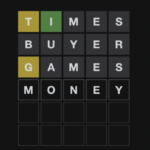Introduction
Every morning, like clockwork, thousands of players open their browsers and head to the same familiar grid of letters. Four puzzles. Nine guesses. A subtle pulse of anxiety, a hint of joy, and—if you’re lucky—a dopamine rush that can carry you through the day. But why? Why has Quordle Today become more than just a word game? Why has it transformed into a ritual, a tiny but powerful part of so many daily routines?
As a game developer, I’ve seen firsthand what goes into building player engagement. From variable reward systems to habit loops, Quordle doesn’t just entertain—it compels. And it’s worth unpacking why.
The Habit Loop in Action
If you’ve ever dabbled in behavioral psychology—or, in my case, spent long hours designing games that people want to return to—you’re probably familiar with the habit loop. It’s a three-part cycle: cue, routine, reward.
Now picture this: you wake up. Your brain’s a little groggy. You reach for your phone. Cue. You tap your browser, type “Quordle Today,” and dive into the day’s puzzle. Routine. You solve it (or don’t), feel clever (or slightly irritated), and walk away feeling mentally alert. Reward.
That’s a perfect loop—and it’s no accident. As developers, we’re not just creating games; we’re creating moments players crave, often before they even realize it.
A Four-Puzzle Fix? The Power of the “Just Enough” Challenge
Unlike its cousin Wordle, Quordle ups the ante with four puzzles at once. That might sound stressful, but as someone who’s spent time fine-tuning difficulty curves, I can tell you: this is exactly the kind of challenge that keeps players hooked.
There’s a psychological sweet spot—known in game design circles as flow—where difficulty and skill align just right. Too easy, and players get bored. Too hard, and they give up. Quordle strikes a delicate balance by asking players to juggle multiple problems with limited guesses. It pushes you just enough to make success feel earned.
And as every designer knows, earned success is the stickiest kind.
Dopamine, Delivered in 26 Letters
Let’s talk brain chemistry. Dopamine is the neurotransmitter behind motivation and reward—and while it’s tempting to think it only kicks in when you win, that’s not quite how it works.
Most dopamine is actually released in anticipation of a reward. And in Quordle, every guess is a suspenseful little event. Every flicker of green or yellow is a cue to keep going. It’s a drip-feed of satisfaction, perfectly engineered.
As a developer, I’ve used these feedback systems in games before—whether it’s a glowing animation, a coin sound, or a progress bar. But Quordle does it with letters. Clean. Subtle. Genius.
Pattern Recognition: Your Brain’s Favorite Hobby
One of the most underappreciated joys of puzzle design is watching players tap into pattern recognition. It’s ancient, it’s primal, and it’s one of the brain’s greatest party tricks.
In Quordle, you’re not just guessing words—you’re scanning for structure: prefixes, vowel positions, common consonants. You’re intuitively calculating probabilities, leaning on phonetic memory, and applying years of passive language learning.
As a game developer, watching this kind of deep mental engagement unfold from a seemingly simple interface is kind of magical. It’s not flashy. But it is profound.
The Illusion of Control
Another core ingredient of game psychology? Control. Or more accurately, the illusion of it. In an unpredictable world, games offer clarity. Defined rules. Predictable outcomes. A fair challenge. When I build games, I know players want some agency—a chance to master something.
Even if it’s as small as today’s word grid. Quordle, with its reset-every-day simplicity, becomes a form of emotional stability. It’s not just a game—it’s something you can win when the rest of the day is chaos.
Social Sharing Without the Noise
As a designer, I love when a game creates community without requiring it. Quordle hits that niche perfectly.
You can post your grid, brag a little, compare with friends—without oversharing, spoiling, or needing an account. It’s social in the best way: frictionless, optional, and organic.
I’ve built systems meant to encourage daily sharing, and trust me, most fall flat. But Quordle keeps it simple. That’s what makes it so successful: it lets the game do the talking.
Risk, Reward, and the Nine-Guess Drama
Here’s something developers talk about behind the scenes: meaningful tension. It’s what happens when failure is possible, but success feels just within reach.
Nine guesses. Four words. Every guess could sink or save your run. That’s tension you feel—and it’s a masterclass in pacing.
As a game dev, I admire how Quordle turns a quiet, solitary puzzle into a nail-biting race. No music, no flashing lights—just the rising pulse of uncertainty. That’s smart design.
Cognitive Closure: Why You Have to Finish
There’s a fascinating psychological principle at play here: cognitive closure. Once you’ve started something, your brain itches to finish it. That’s why it’s so hard to walk away mid-Quordle.
This is something I design for intentionally in my own games—especially puzzle-based ones. You start a pattern. You need to complete it. It’s not compulsion—it’s completion. And Quordle uses that instinct perfectly.
Mistakes Feel Personal—and That’s the Hook
One of the most interesting challenges in game development is creating emotional stakes. Not just points or leaderboards—but feeling.
Quordle does this subtly. When you fail, it stings—not because you lost to an enemy or missed a jump, but because you made a bad call. You misread the clues. The error was internal.
That’s powerful. It makes winning feel like self-validation—and losing feel like a personal puzzle to solve. It’s the kind of feedback loop that keeps players thinking about the game long after they’ve closed the tab.
It’s Not Just a Game. It’s a Ritual.
For many, Quordle isn’t just a brain teaser—it’s a part of their day. A few minutes of quiet, focus, and a small challenge overcome. As a game developer, this is the dream: building something that becomes a moment in someone’s life.
You don’t need daily bonuses, flashy updates, or even a leaderboard to achieve this. You just need to build something that respects the player’s time, challenges their brain, and rewards them emotionally. That’s exactly what Quordle does.
So, Are We Really Addicted?
Let’s talk about that word: addiction. From a clinical standpoint, no—Quordle isn’t addictive. But from a behavioral standpoint? Well, it’s compelling. Hugely so.
In game design, we often walk a fine line between “engagement” and “compulsion.” The goal is to keep players coming back because they want to, not because they have to.
Quordle walks that line with grace. It doesn’t lure you in with dark patterns or pay-to-win mechanics. It invites you in—with language, logic, and a little luck. And that kind of invitation? It’s hard to resist.
Final Word: The Joy of the Small Victory
In the end, what’s most impressive about Quordle Today isn’t its complexity. It’s its elegance. It’s a daily puzzle that respects your time, challenges your intellect, and rewards your effort. As a developer, I can’t help but admire how much it accomplishes with so little. No ads. No accounts. No pressure.
Just four puzzles, nine guesses, and one very satisfied brain. So tomorrow morning, when you fire it up again—know that it’s not just a game you’re playing. You’re participating in a masterclass in minimalist game design. And maybe, just maybe, you’re learning a little more about yourself along the way.



